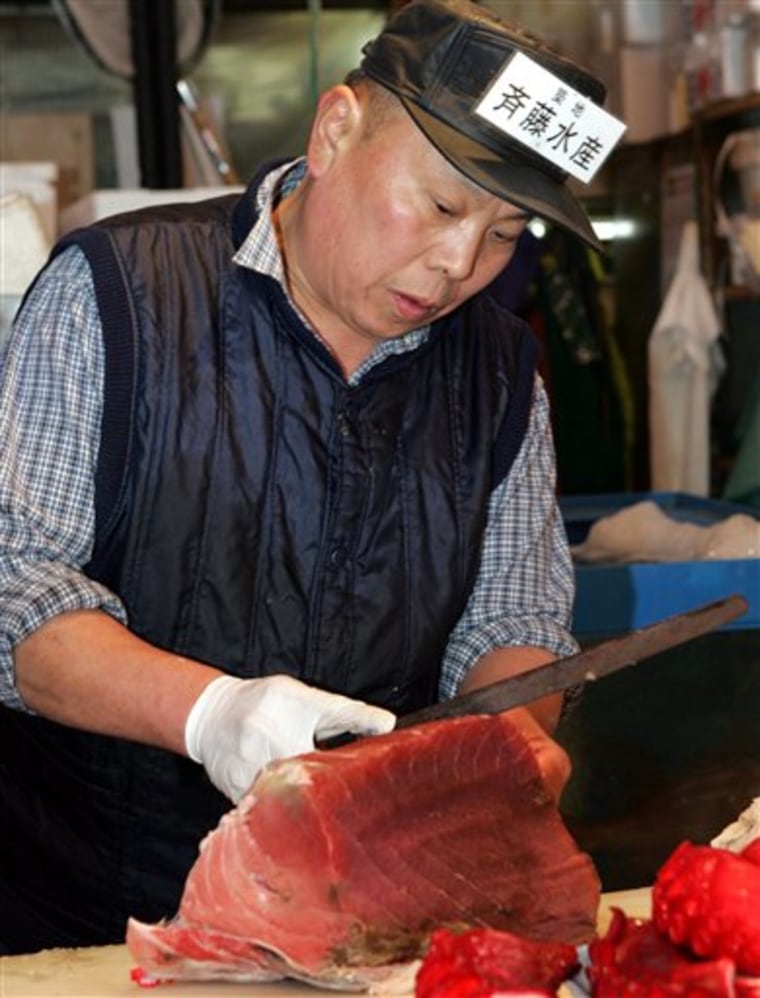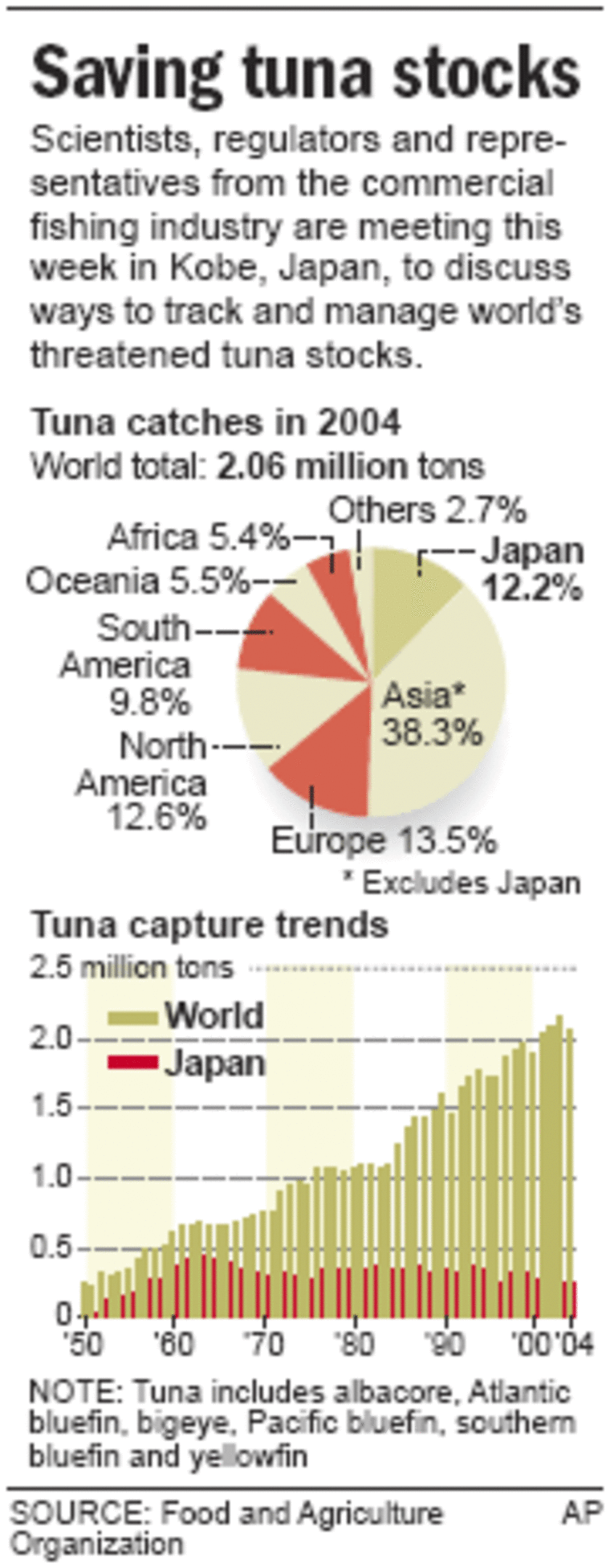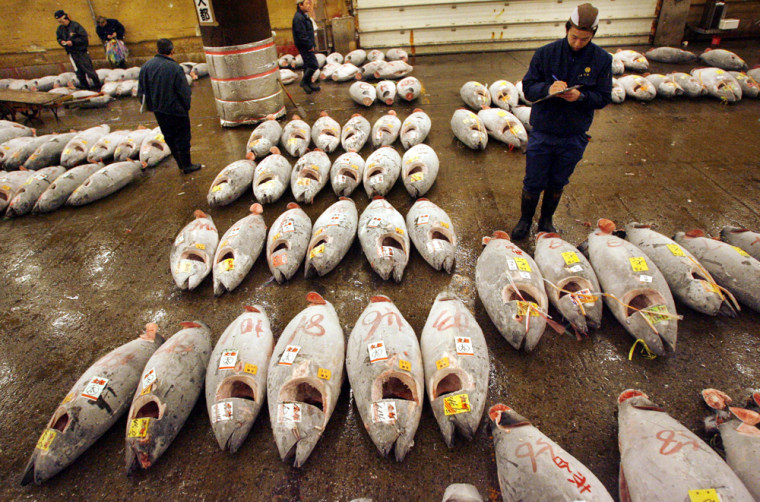International regulators adopted a plan Friday aimed at slowing the decline in global tuna stocks by reining in illegal fishing, controlling the growth of fleets and sharing data on stock assessments.
The details of the final version were not immediately released, but delegates hailed it as an important first step in the battle to keep overfishing from wiping out tuna stocks.
“Maybe the steps we made this week seem small, but this is a big step, a historical step, I think,” said the chair of the meeting, Masanori Miyahara, of Japan’s Fisheries Agency.
Conservationists, however, expressed disappointment the plan did not go far enough to put controls on the industry and address the environmental damage caused by tuna fishing.
“We do see this meeting as a failure,” said Alistair Graham of WWF International.
The meeting took place amid rising concerns about the sustainability of the world’s tuna supply.
The final report had been expected to call for closer communication among regulators, especially in sharing information on illegal fishing, scientific calculations of the size of tuna stocks and other issues, delegates said.
“It’s a common heritage and it’s being destroyed,” said David Bevan, Canadian Fisheries and Oceans assistant deputy minister. “It needs to be protected.”
By 2004, for example, the number of adult Atlantic bluefin tuna capable of spawning had plummeted to roughly 19 percent of the 1975 level in the western half of the ocean, according to the International Commission for the Conservation of Atlantic Tunas.
Fishing differences
The meeting in Kobe, however, also highlighted some of the conflicts among participants.

Japan, for instance, is campaigning for limits on fishing of smaller tuna, while Europe has resisted the move to protect its canned tuna industry. Larger countries want to limit fishing capacity, but poorer island nations want to expand their fleets.
Another key issue is stepped-up monitoring of the regulatory bodies themselves, which have been criticized by conservationists for failing to stop the depletion of tuna stocks. Some countries, such as the United States, Canada and Australia, are pushing for tougher oversight for regulators.
“There is a commitment to review performance with a common methodology,” said David Balton, U.S. deputy assistant secretary of state for oceans and fisheries. “We’re looking to create a scorecard.”
Too many fleets?
A major issue at the conference was excess capacity in fishing fleets.
Critics say excess capacity and profits are determining how many tuna are caught. They argue instead that regulators should decide how many fish can be caught, and then tailor the size of fleets to fit those limits.

“It’s overcapacity that causes a lot of these problems,” said D.G. Webster, a researcher at the Wrigley Institute for Environmental Studies in Los Angeles, California.
Webster, however, was not optimistic about progress on cutting fishing fleets, in part because it’s difficult to move fishermen into other industries. “It’s too hard because nobody wants to give up boats,” she said.
Cracking down on so-called tuna pirates was also under discussion. Overfishing and poaching are largely to blame for tumbling stocks worldwide, conservationists say.
Renegade boats are known to fly the flags of countries with weak regulations, for instance, knowing that their overfishing will not be noticed. Smaller boats, meanwhile, are not properly regulated under current rules.
One possibility discussed was electronic tagging of legally fished tuna when they’re caught. Some countries already use plastic tags, but delegates said that program could be expanded to cheap, easily traceable electronic tags.
Japan’s role as host of the Kobe conference is highly symbolic because it is a major tuna consumer, accounting for 12 percent of the 2.06 million ton global catch. Japanese eat about a quarter of the world’s supply of the five big species: bluefin, southern bluefin, bigeye, yellowfin and albacore.
Representatives from the commercial fishing industry, environmental groups and government regulators also attended the conference, which ended Friday.
